Revealed: the BEST foods to eat if you want to look younger
You are what you eat

Kate Korolova/Shutterstock
It’s often said beauty comes from within – and that includes what you eat. While there are no miracle foods to turn back time, you can look and feel younger by consistently eating a healthy, nutrient-packed diet. Here are some top age-proofing foods to include in your daily diet to boost your energy, improve your skin and give you a youthful glow.
Read through our gallery to discover 31 foods that will make you look younger – counting down to the most youth-boosting of all.
Our ranking is based on research into each food and its anti-ageing potential, and on the opinions of our team.
31. Avocados

Nataliya Arzamasova/Shutterstock
This much-loved green fruit is a rich source of skin-friendly monounsaturated fats. Avocados are also packed with vitamin E, boosting antioxidant protection for skin cells from the inside out. So now you can enjoy your avo on toast even more – knowing that as well as tasting delicious, it's helping you look younger, too.
30. Broccoli
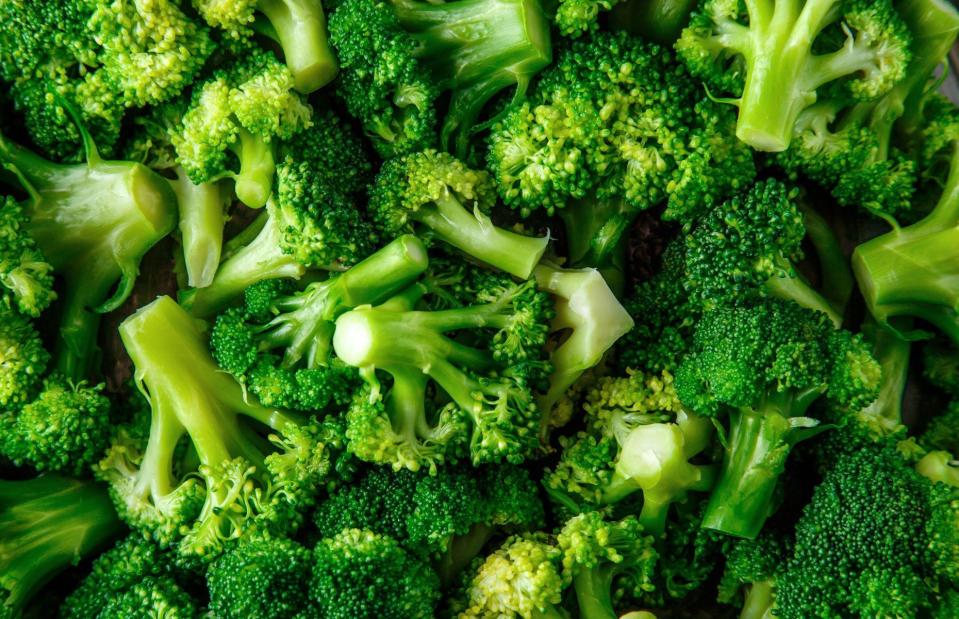
Bukhta Yurii/Shutterstock
Broccoli is rich in anti-inflammatory antioxidants vitamin C and K, which help the body produce collagen, as well as calcium, which improves the appearance of the skin's surface and aids cell turnover. Broccoli also contains a compound called NMN (or nicotinamide mononucleotide), which Washington University scientists found to slow the ageing process in a 2016 study using mice.
29. Picked herrings
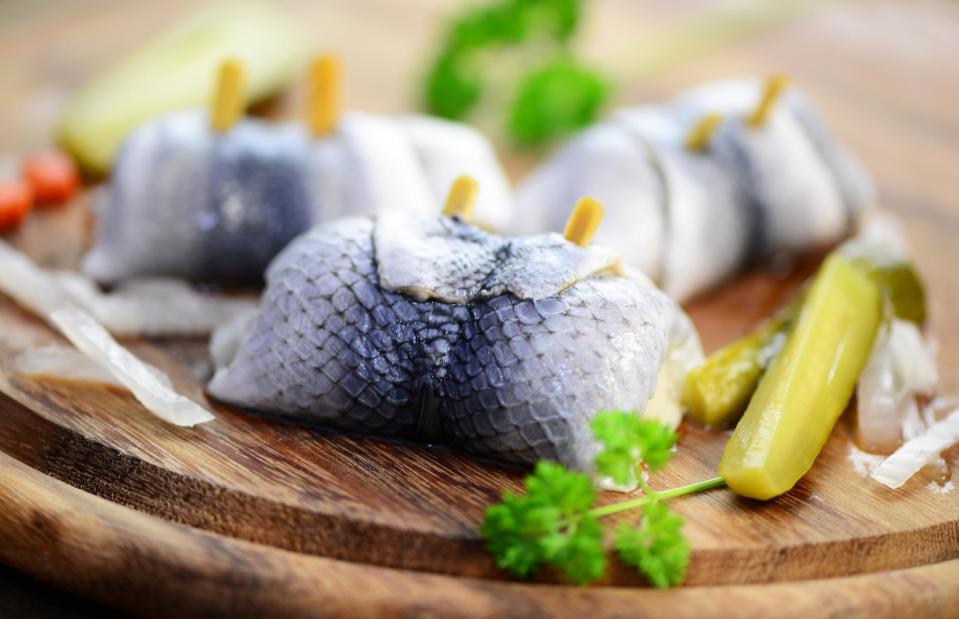
photocrew1/Shutterstock
Pickled herrings, also known as rollmops, are extremely high in vitamin D. That's good for future-proofing your bones, but there could be a potential benefit for staving off the appearance of grey hairs, too. In one small study by the International Journal of Trichology, premature greying was associated with lower levels of vitamin D, iron and calcium.
28. Ginger

Dream79/Shutterstock
Whether grated, in powder form or preserved in syrup, ginger adds warming spice to sweet and savoury foods, from noodle dishes to cakes. As well as being delicious, it could also help you stay young thanks to its potential for reducing inflammation in the body and preventing loss of skin elasticity from UVB damage. A 2022 meta-analysis in Oxidative Medicine and Cellular Longevity, which looked at existing research on ginger’s health benefits, concluded that ginger could have multiple anti-ageing properties.
27. Soup
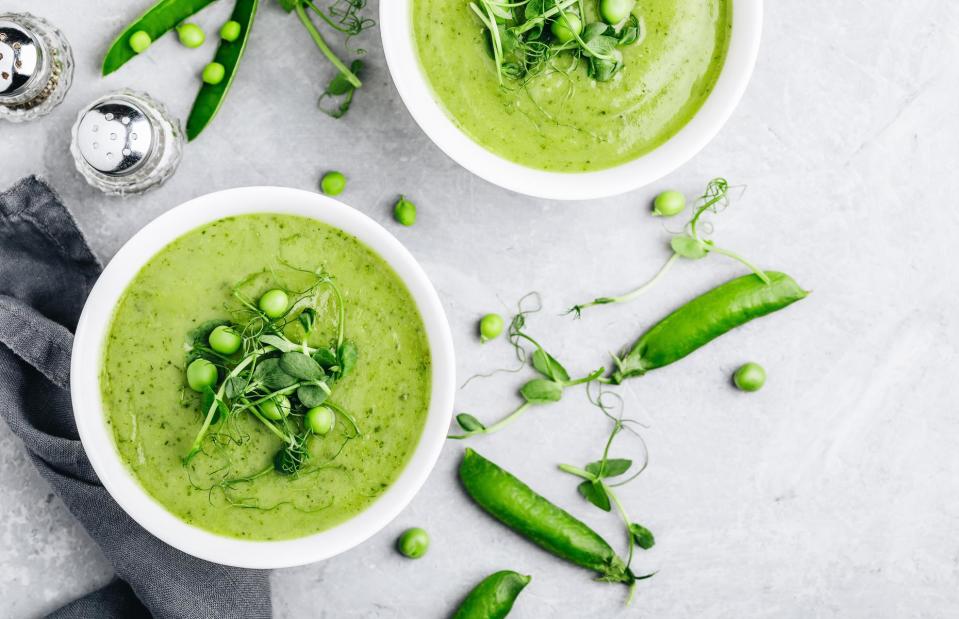
Ekaterina Kondratova/Shutterstock
A big bowl of vegetable soup is a great way to ensure you get your five-a-day and feed your skin, hair and nails with the nutrients they need. A Dutch study published in the Journal of the American Academy of Dermatology in 2018 found a statistically significant correlation between soup eating and fewer wrinkles in older women.
26. Pomegranates
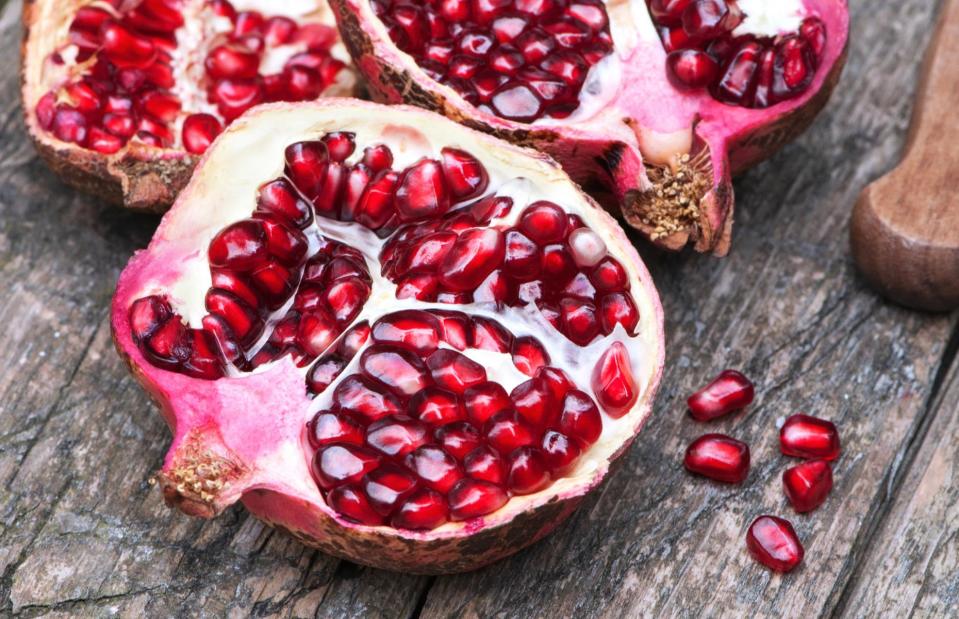
webwaffe/Shutterstock
Pomegranates and pomegranate juice are brimming with phytochemicals (a type of compound found in plants) that contribute to healthier ageing, largely due to anti-inflammatory effects. A 2019 human pilot study published in Nature Metabolism found that a compound called urolithin A in pomegranates slowed muscle loss and improved mitochondrial function (the ability of cells to produce energy), which might translate into looking and feeling younger for longer.
25. Flax seeds

shine.graphics/Shutterstock
Seeds and nuts are fantastic additions to a balanced diet – and flax seeds are among the best. Just a spoonful or two of flax seeds each day will give you a dose of healthy fats, omega-3 fatty acids and protein. They also contain antioxidants to help prevent damage to cells, protecting your skin and hair from signs of ageing. Ground flax seeds are easier to digest than whole ones; they can be added to smoothies or sprinkled onto porridge or a salad for a mild, nutty taste.
24. Grains
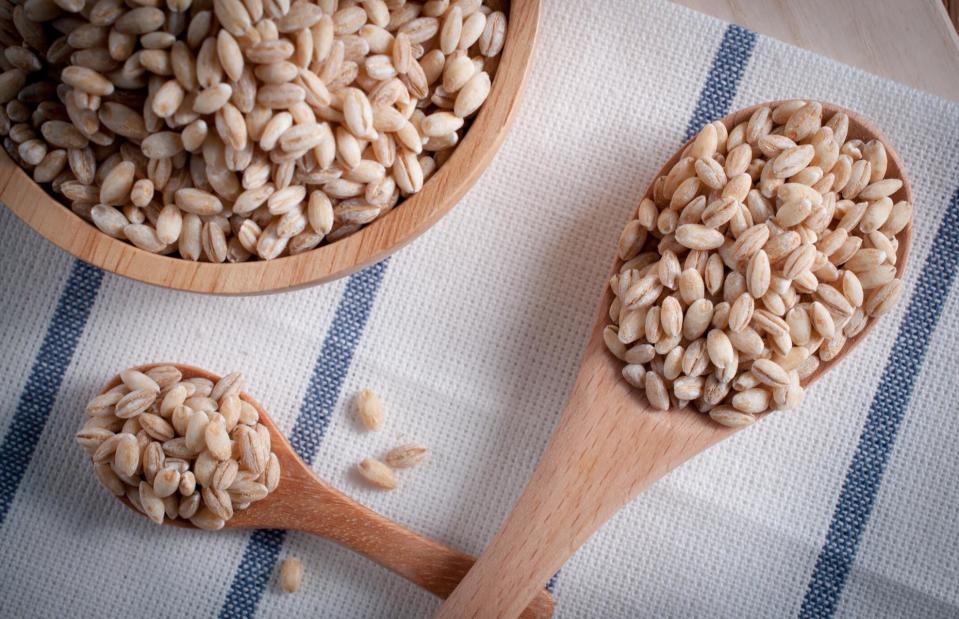
GETSARA/Shutterstock
Oats, quinoa and pearl barley are lower glycaemic index (slower energy releasing) carbohydrates that you should be trying to get into your diet (rather than the higher GI ones like potatoes, rice and white bread). Various studies have shown that a lower glycaemic index diet reduces your risk of acne, while higher blood sugar levels are associated with looking older.
23. Mushrooms

Olena Rudo/Shutterstock
Mushrooms contain two key antioxidants that could help to slow the effects of ageing and improve health. They’ve been found to have high levels of ergothioneine (ERGO) and glutathione (GSH), which can help to prevent tissue damage, keeping you looking young and even combating certain age-related health problems, such as Alzheimer's, heart disease and cancer. There are so many ways to use mushrooms; enjoy them in curries, stews, soups and more.
22. Papaya

itaci/Shutterstock
Often described as a superfood, this juicy fruit is rich in some important vitamins and minerals, as well as antioxidants. Vitamins A, C and E are all found in papaya and are important to help keep your skin healthy. Papaya is great as it is, but fermented papaya may have even greater anti-ageing properties, containing more antioxidants than raw papaya. The flesh feels similar to a melon, and you can cut it up to eat as a snack or use it in smoothies.
21. Calves’ liver
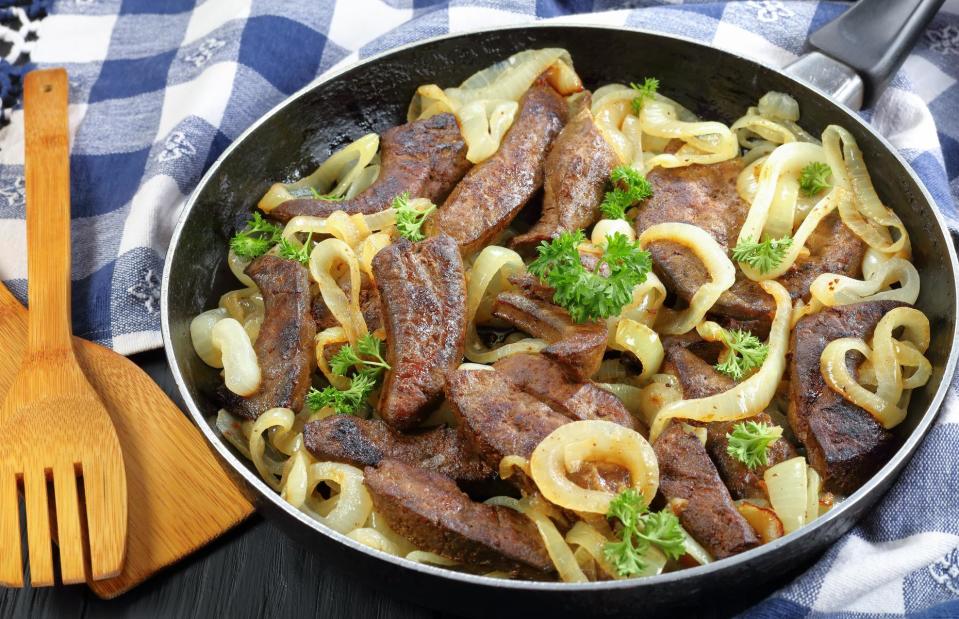
from my point of view/Shutterstock
Copper contributes to normal hair pigmentation, and research by the International Journal of Trichology has shown a link between lower levels of copper and the early appearance of white hairs. The best sources of copper are lambs’ and calves’ liver, as well as nuts and seeds (think Brazil nuts, cashews and sunflower seeds) and crab meat.
20. Saffron

New Africa/Shutterstock
Highly prized saffron, a spice that comes from a type of crocus flower, is a little pricey, but could be worth the cost. If your aim is to stay looking young, saffron’s antioxidant powers may help you achieve your goal. The antioxidants in saffron have the potential to prevent sun damage to the skin, and it has anti-inflammatory properties too. Saffron could also help to reduce hyperpigmentation (darker spots on the skin) and boost collagen production for improved skin elasticity and fewer wrinkles.
19. Carrots
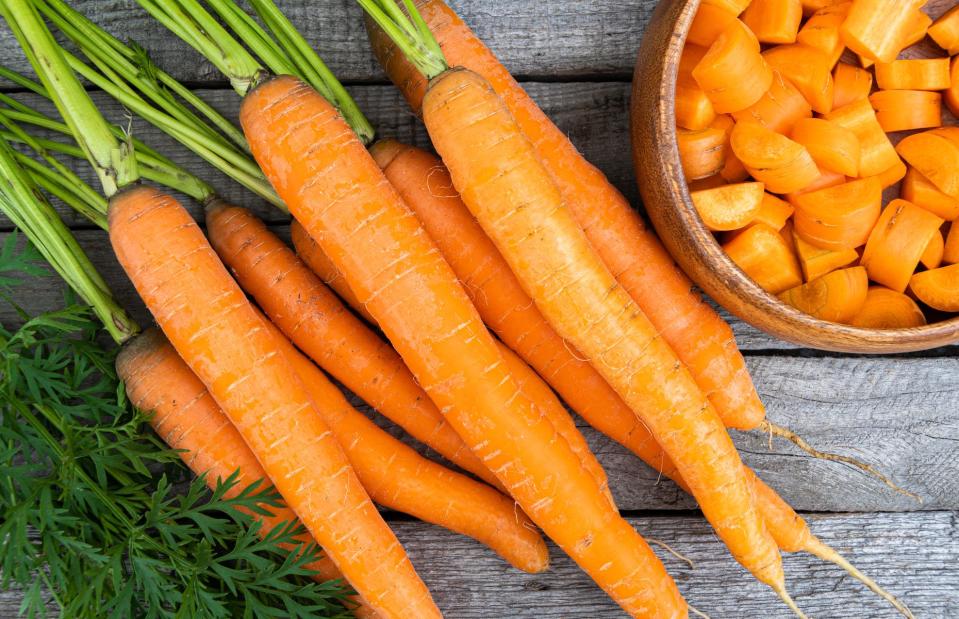
AMV_80/Shutterstock
Carrots and other orange-red fruit and vegetables – such as tomatoes, red peppers, sweet potato, cantaloupe and apricots – are rich in naturally occurring pigments called carotenoids, which can have a cosmetic effect on Caucasian skin, giving it a golden glow. A study in the journal Behavioral Ecology found that this increased people’s perception of facial attractiveness.
18. White fish
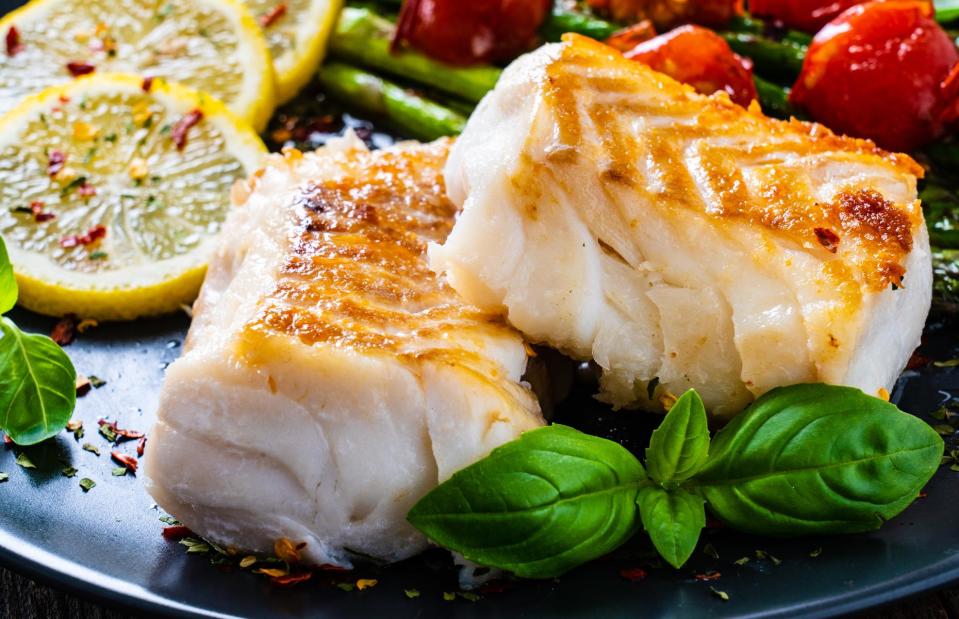
Jacek Chabraszewski/Shutterstock
Haddock, cod and all other types of white fish are packed with iodine, a nutrient that helps keep your metabolism fired up, as well as keeping skin cells healthy. A 2020 study by Clinical Endocrinology found that while iodine levels have increased in the UK population in recent years, deficiency is a problem for vulnerable groups. A 2016 study by The Lancet ranked the UK among the 10 most iodine-deficient countries globally.
17. Pineapple

Kate Korolova/Shutterstock
Like other fruits and vegetables that can keep you looking youthful, pineapple is a good source of antioxidants. Because pineapple is also rich in insoluble fibre, the protective effect of these antioxidants could be greater in pineapple than in some other foods – and the fibre is good for your digestive system too. There’s plenty of skin health–boosting vitamin C in the prickly fruit as well, so mix some into a fruit salad, bake a pineapple upside down cake or maybe put it on a pizza (if that's your thing).
16. Tomatoes
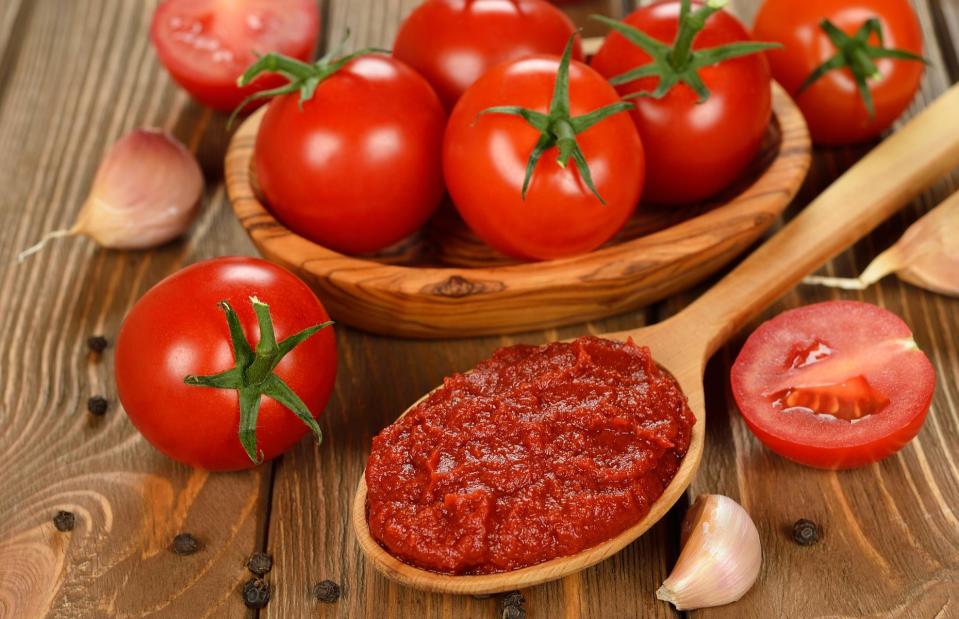
Olyina V/Shutterstock
The red lycopene pigment in tomatoes is better known for its link to a reduced risk of heart attacks and strokes. But, according to the Journal of Nutrition, lycopene is also a natural sunscreen, working within our cells to protect against UV-induced sunburn and wrinkles. Tomatoes yield more lycopene when they are cooked – so tuck into tomato soup, passata and canned tomatoes.
15. Cashews
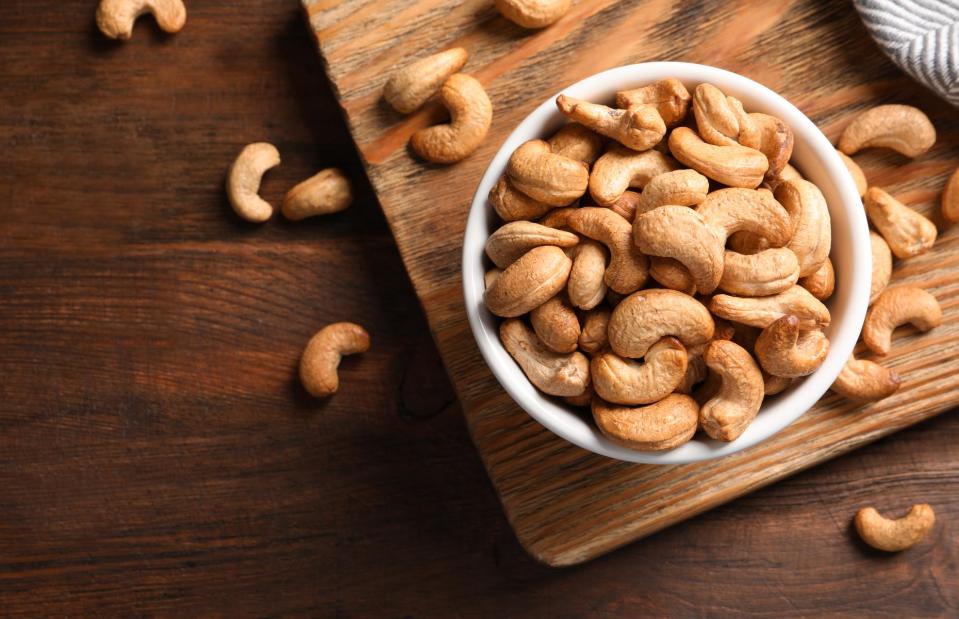
New Africa/Shutterstock
Cashews have over twice the iron concentration of grilled rib-eye steak, which may help to reduce hair loss, keep you rosy-cheeked and stave off debilitating fatigue. Cashews contain 6mg iron per 3.5oz (100g), while the same amount of steak only contains 2.6mg. The nuts are also a good source of zinc, which can help in healing skin breakouts.
14. Sesame seeds

rsooll/Shutterstock
A sprinkle of sesame seeds is easy to add to curries, stir-fries and salads, and it could give you a youthful advantage too. Sesame seeds may fight inflammation, possibly thanks to the compound sesamin, and they’re a good source of niacin (vitamin B3), which helps to keep skin healthy. They’re also rich in antioxidants, plus they provide fibre and protein. Sesame seeds may be useful during menopause, as they contain compounds that are similar to oestrogen and could help to counteract low levels of the hormone.
13. Legumes
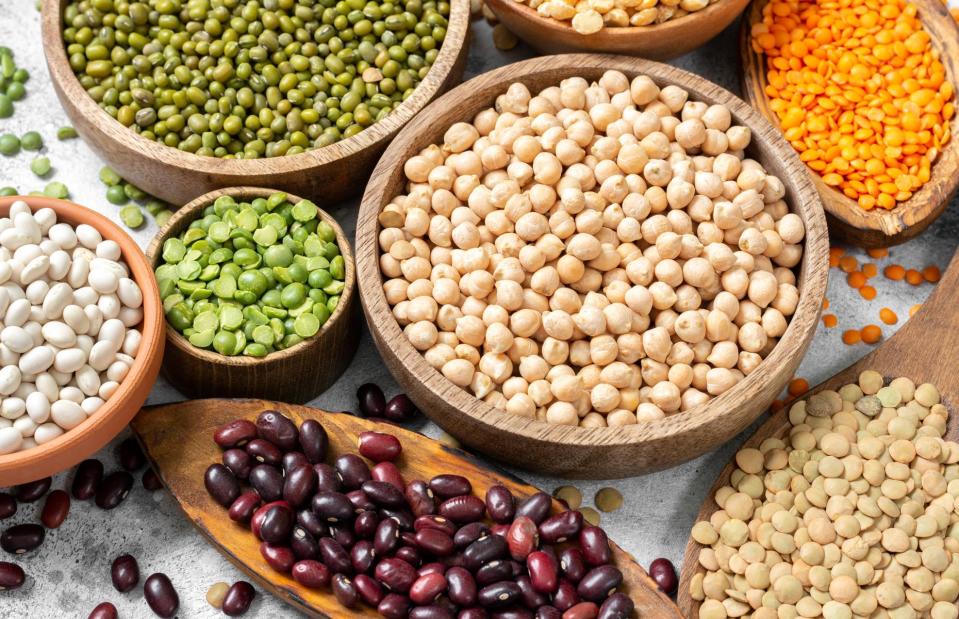
Lyudmila Zavyalova/Shutterstock
One reason why legumes, or pulses, could help protect against skin damage and wrinkles is that they contain natural plant oestrogens (phytoestrogens). There’s some evidence to suggest that these can help to improve the water content of the skin, as well as protect skin cells from oxidative stress.
12. Kiwi fruit
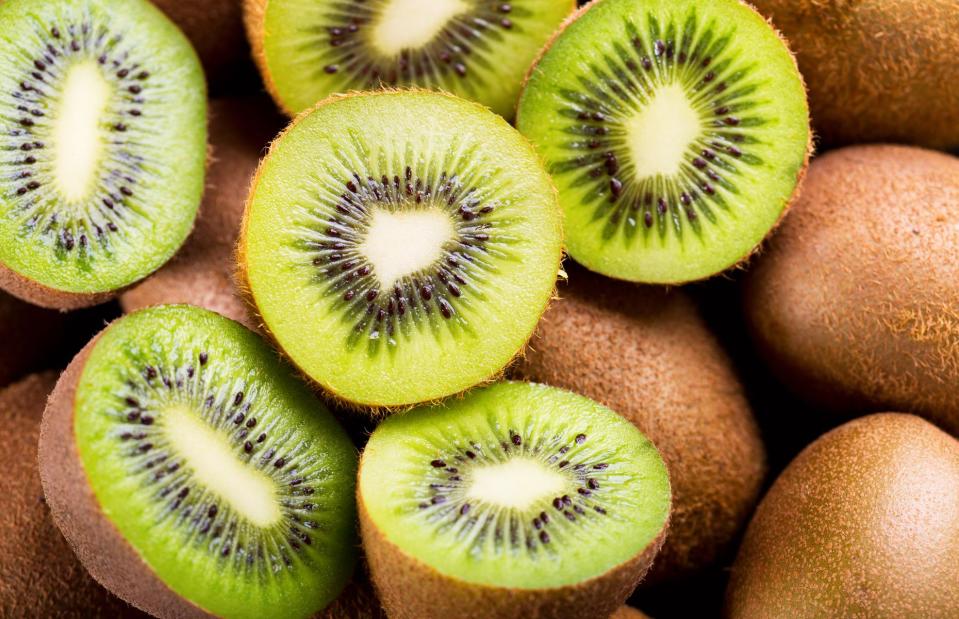
Nitr/Shutterstock
A bad night’s sleep can add years to your face. A 2013 study in the journal Sleep found that people rated sleep-deprived individuals as having more wrinkles/fine lines and droopier mouths. For a better chance of a restful night, eat a couple of melatonin-containing kiwi fruit before bed. In a small 2017 clinical trial by Sleep and Biological Rhythms, insomniacs reported better sleep quality and daytime functioning after eating the fruit before bed.
11. Turmeric

siriratsavett/Shutterstock
All the rage as a health-boosting ingredient, turmeric has been labelled an ‘anti-ageing superfood’. But what can it actually do to help you look younger? The compound curcumin, found in turmeric, could lower oxidative stress and inflammation, helping to improve your skin and overall health. It could also help you feel younger, as well as look it, with the potential to boost your energy levels. A common ingredient in South Asian cooking, turmeric is easy to add in ground form to everything from scrambled eggs to smoothies.
10. Olive oil

sebra/Shutterstock
In a study by the Journal of the American College of Nutrition involving people from Sweden, Greece and Australia, those with a higher intake of monounsaturated fat, particularly olive oil, had less wrinkling in a sun-exposed site (the back of the hand) than those who favoured butter and margarine. Vegetables and pulses were also linked with less wrinkling.
9. Cocoa
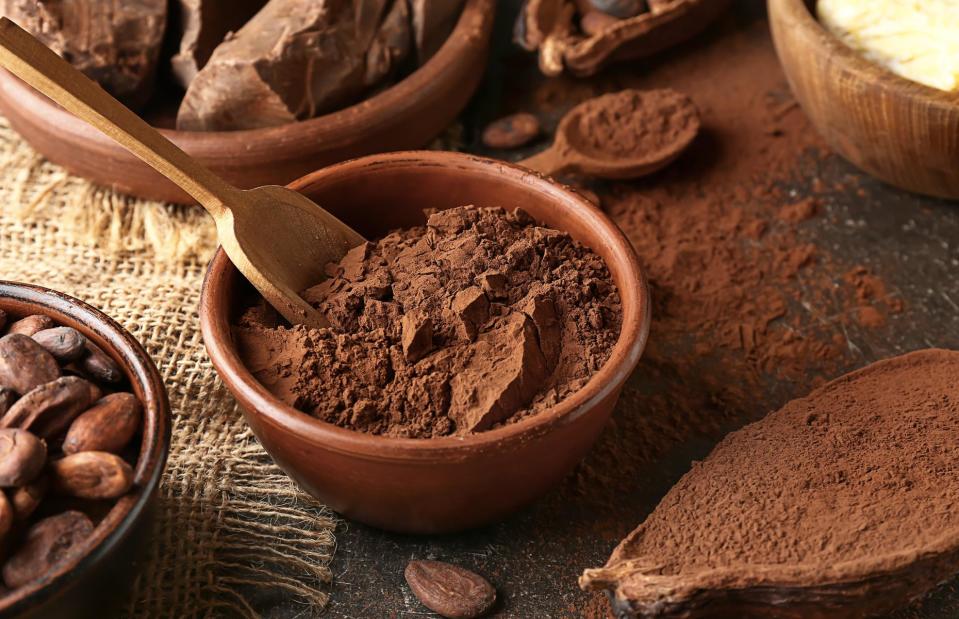
Pixel-Shot/Shutterstock
An evening cup of cocoa has the power to be a beauty booster – just choose one with a high content of flavanol antioxidants, a key ingredient that relaxes blood vessels. Research suggests one cup of high-flavanol cocoa, available in health food stores or online, increases blood and oxygen flow to the skin and decreases sunburn risk, according to the Journal of Nutrition. Go for dark chocolate with at least 70% cocoa if you want to reap its benefits.
8. Eggs
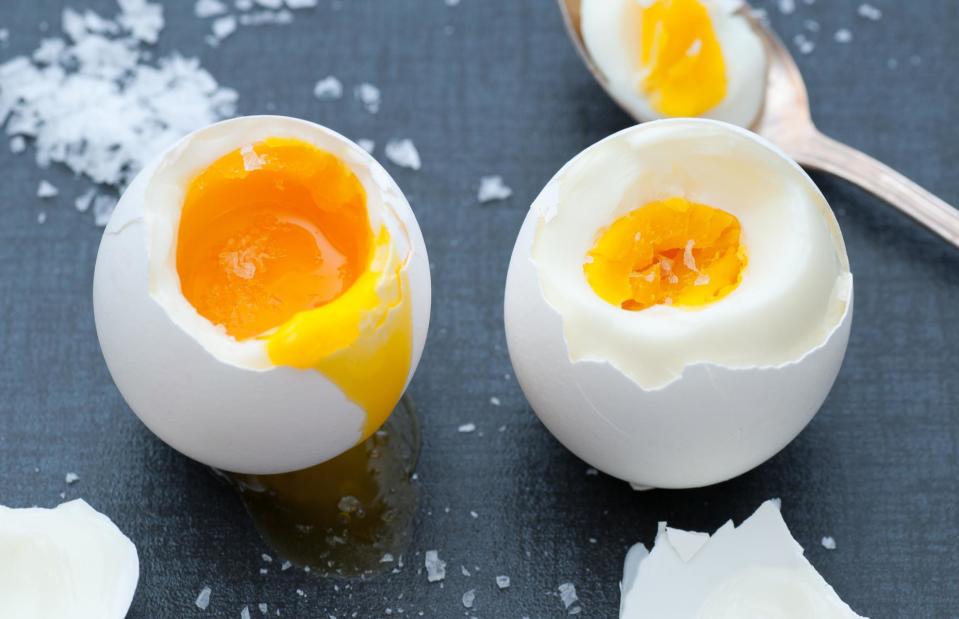
Barbro Bergfeldt/Shutterstock
Eggs provide high-quality protein – the basic building block of healthy skin – but are also a good source of iron (found in the yolks), with one egg providing 0.5mg of iron (RDA is 8mg). Iron is vital to keep anaemia, which ages you by making you look tired and pale, at bay. Other good sources are red meat, lentils, leafy greens and nuts.
7. Green tea

Camelott/Shutterstock
Drinking a few daily cups of green tea has been linked with less skin damage. The reason? It contains a high level of a key antioxidant known as epigallocatechin gallate (ECGC). In 2019, cell culture studies published in Environmental Pollution, highlighted that ECGC was shown to protect against pollution-related skin ageing.
6. Berries
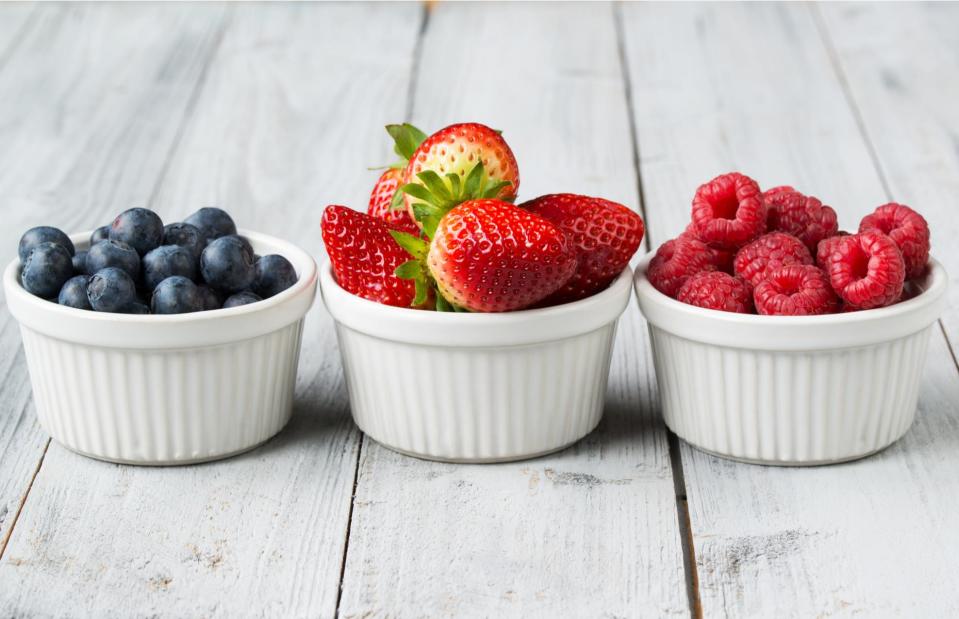
Daria Medvedeva/Shutterstock
Berries are full of anthocyanins – potent antioxidant and anti-inflammatory ingredients that protect against collagen breakdown, according to Molecular Nutrition & Food Research. Plus, Molecules journal found that anthocyanins appear to boost the health of gut bacteria, which in turn can reduce age-related bone loss.
5. Almonds
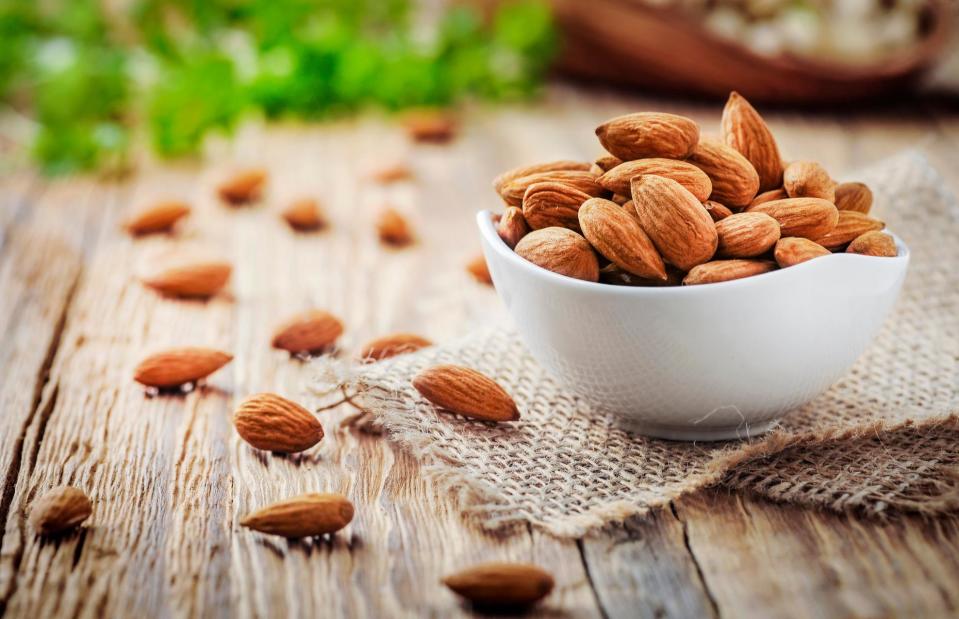
Krasula/Shutterstock
A 2021 study by Nutrients journal found that almonds reduced the appearance of wrinkles and pigmentation in light-skinned, postmenopausal women who consumed just over two daily handfuls of the nuts for nearly six months. The study was partly funded by California Almonds but was carried out independently to high standards. Almonds are rich in skin-friendly essential fatty acids, and they supply nearly 7mg of antioxidant vitamin E per 1oz (28g) handful – nearly half the recommended daily amount.
4. Citrus fruits
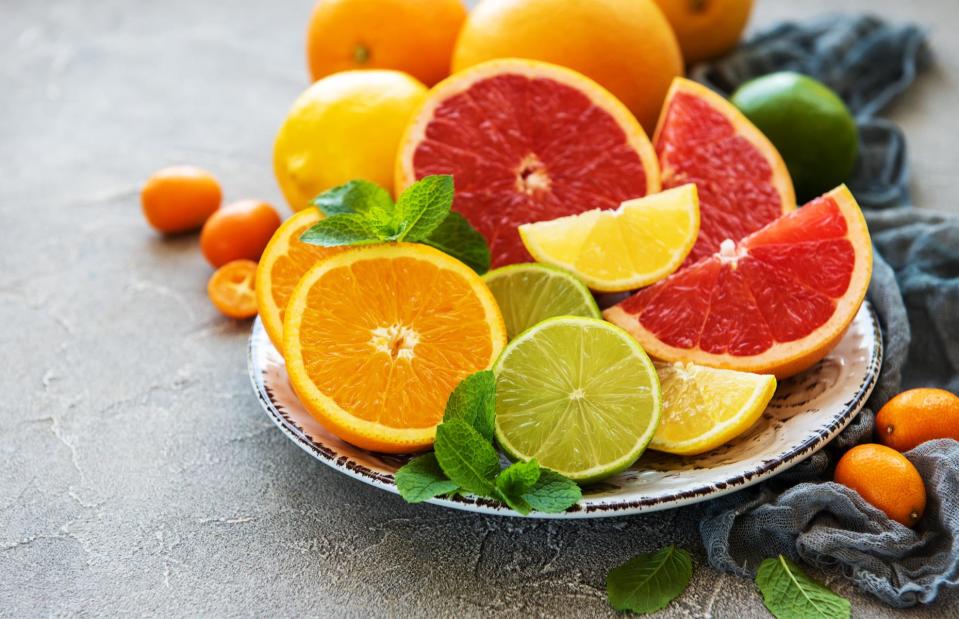
almaje/Shutterstock
A daily helping of citrus fruits will pretty much guarantee that you get enough vitamin C, which has been linked with less wrinkled and dry-looking skin thanks to its cell-protecting abilities. One orange provides 81mg of vitamin C, which is more than double the minimum recommended intake of 40mg. Other great sources of vitamin C are peppers, nectarines, strawberries and leafy greens.
3. Salmon
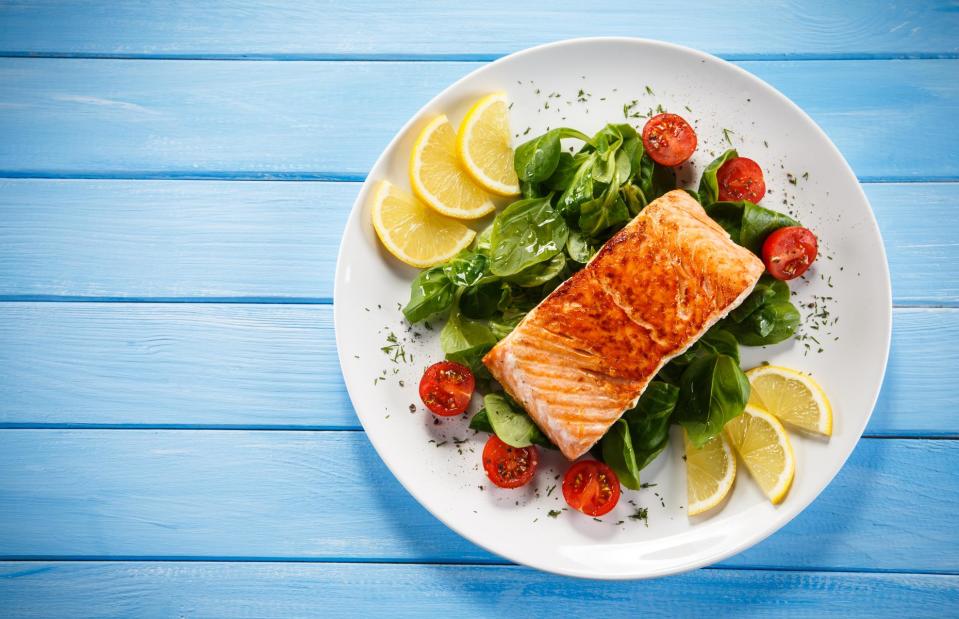
Jacek Chabraszewski/Shutterstock
Salmon is extremely high in omega-3 fats, which are anti-inflammatory and have been proven to protect against UV damage and increase hydration in various studies. Not only that, but salmon is also packed with protein and vitamin B12 to help maintain cells.
2. Water (and plenty of it)

SedovaY/Shutterstock
It’s worth repeating: drinking plenty of water is good for your complexion. In a 2015 study published in Clinical, Cosmetic and Investigational Dermatology, young women who were asked to drink an extra 2 litres of water a day saw increases in hydration that were enough to 'positively impact normal skin physiology'. In beauty speak, that’s plumped-out, smoother skin.
1. Food without additives
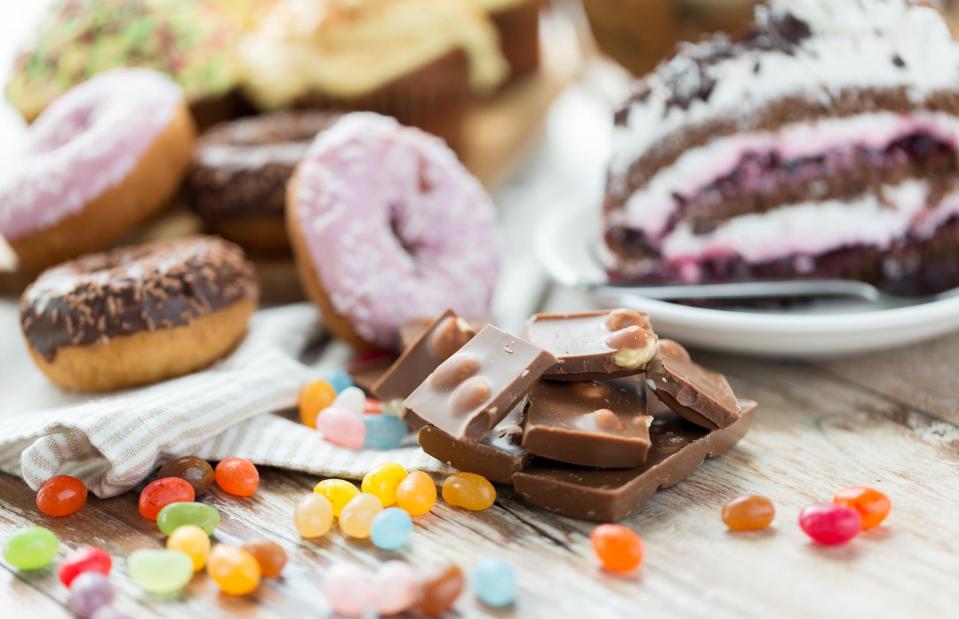
Syda Productions/Shutterstock
Sugary, fatty convenience food with flavourings, emulsifiers and other additives count as 'ultra-processed' (think cookies, hot dogs, savoury snacks and instant noodles). Avoid too much ultra-processed food if you want to live longer, as a high intake has been linked to shorter telomere length by the American Journal of Clinical Nutrition. Telomeres are the sequence of genetic material at each end of your chromosomes. In a nutshell, shorter telomere lengths mean you're ageing faster.
Find out more about ultra-processed foods and why you should limit them in your diet
Last updated by Laura Ellis.


